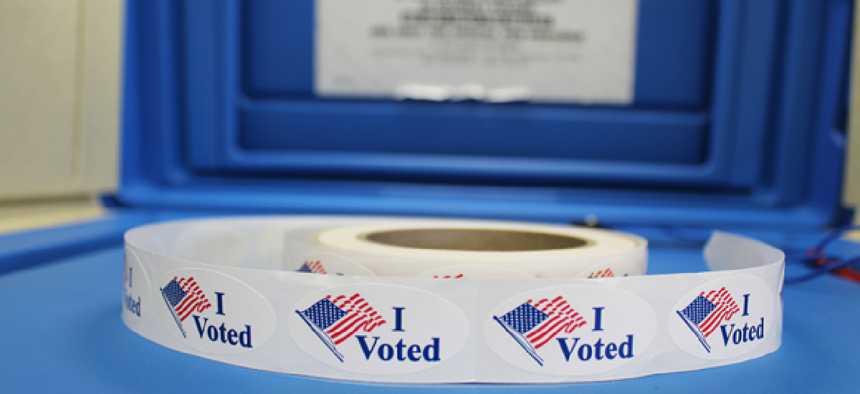Locking down voting tech

State election officials are making plans to tighten security all along the voting chain -- from voter registration to machine integrity and audit trails -- with help from the Department of Homeland Security under the new critical infrastructure designation.
State election officials are making plans to tighten security all along the voting chain – from voter registration to machine integrity, audit trails and help from the Department of Homeland Security under the new critical infrastructure designation.
At a Feb. 13-14 meeting of the Election Assistance Commission, New Jersey State Department's division of elections Bob Giles said that although his state’s voting machines are not connected to the internet, the attention garnered by Russia's reported electoral influence has led to a rethinking of his agency's cybersecurity protocols.
Giles said cyber hygiene practices such as improving password strength and multifactor authentication will be included in the state's plan to modernize its voter registration system.
"The other thing we heard a lot about this election is who is making our voting machines," he said, adding that moving forward, New Jersey will partner with the DHS to ensure voting machine security.
Another important tool for establishing electoral integrity is an auditable record of each state's votes.
David Wagner, a member of EAC's Technical Guidelines Development Committee, said that “the number one most important thing we can do for cybersecurity is make sure the systems are auditable." He conceded election auditing "can't prove that there was no hacking, but what it can prove is that the outcome was called correctly" and that there are no patterns of voting irregularity.
The Electronic Frontier Foundation has lobbied for auditable paper records in all 50 states -- warning that "voting machines, especially those that have digital components, are intrinsically susceptible to being hacked." Several states' election systems lack any sort of paper trail.
Currently, election systems are tagged by DHS as critical infrastructure, a designation that has been met with handwringing from state and local officials.
On the second day of the meeting, Geoff Hale, DHS' cybersecurity strategy and integration program manager, outlined the changes and benefits of the recent designation.
The primary benefits, Hale said, are added protections against nation-states, guaranteed priority in DHS assistance requests and greater access to information on vulnerabilities. "Without institutionalizing this through a designation of critical infrastructure, there's no guarantee the services would be available," he said.
"Being critical infrastructure, there are a set of international norms that" prevent countries from attacking these networks, Hale said. "And potentially waiting nine months for a risk and vulnerability assessment may not work on a procurement timeline" for election officials.
Hale also stressed that the "full threat information" available to states that opt in for DHS assistance is not subject to state sunshine laws or Freedom of Information Act requests.
In advance of the 2016 general election, several states including Georgia objected to the idea of a critical infrastructure designation, but most worked with DHS to make sure their voting systems were secure.
Some state officials continued to question the need for the designation. EAC commissioner Matthew Masterson asked how the designation will specifically affect how local election officials conduct their operations.
Hale said the designation impacts "very little" in terms of electoral operations; it was done to "institutionalize a vital aspect of our democracy." He emphasized that DHS's assistance was voluntary.
Another EAC commissioner, Christy McCormick, remains opposed to the designation, and told FCW, GCN’s sister site, that DHS's presentation did little to clear up her lingering uncertainties.
McCormick dismissed the international protections as a "handshake agreement" that she did not think "changes anything." She questioned the benefit of elections now getting priority attention because "I would think they would get priority anyway."
She also said the classified information sharing proposed by DHS is moving in the wrong direction in terms of electoral transparency, and she remained dubious of DHS's categorization of the voluntary nature of states' participation.
"It's not really voluntary, right, because if you don't volunteer, you don't get the information that they have," she said. "Of course states are going to have to volunteer if they want the information DHS has… Nobody's going to not participate in security measures."
Longer versions of this coverage was first posted to FCW, a sister site to GCN, here and here.





